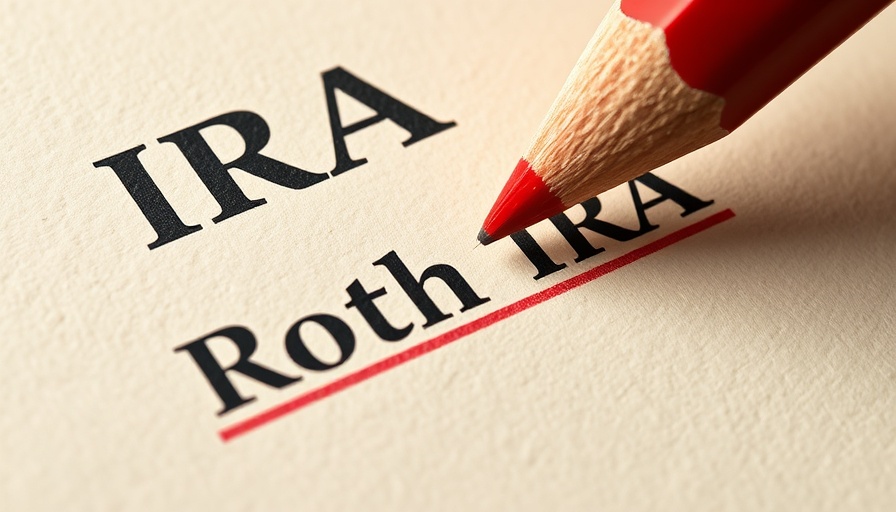
Understanding the Roth IRA Conversion: Key Considerations
As soaring market volatility and uncertain economic conditions continue to dominate headlines, many investors are re-evaluating their retirement strategies. One popular option, especially in light of recent tax considerations, is the conversion from a traditional IRA to a Roth IRA. Before making such a significant financial decision, it is essential to weigh various factors that could impact your long-term financial health.
1. Assessing Current and Future Tax Rates
The crux of deciding whether to convert a traditional IRA to a Roth IRA lies in understanding tax implications. When converting, individuals must pay income tax on the amount converted. However, once the funds reside in a Roth IRA, further growth is tax-free, making future withdrawals advantageous if you anticipate being in a higher tax bracket during retirement. Current federal tax rates remain historically low, but this landscape may shift with evolving political policies aimed at increasing revenue through higher taxes on the wealthiest individuals.
2. The Impact of Medicare Premiums
Another pivotal consideration is the potential impact on Medicare premiums. As income levels rise due to a conversion, beneficiaries may find themselves subject to higher premiums for Medicare Part B and Part D. This phenomenon—known as income-related monthly adjustment amount (IRMAA)—can significantly influence an individual’s net retirement income. Careful planning is required to ensure that increased premiums do not offset the benefits of tax-free withdrawals later.
3. Evaluating the Benefits of Tax Diversification
Tax diversification is a concept that promotes having investments across various accounts subject to different tax treatments, including taxable accounts, tax-deferred accounts like traditional IRAs, and tax-free accounts such as Roth IRAs. By having a mix, you can maintain flexibility in retirement to manage your tax liabilities more efficiently.
4. Long-Term Growth Potential
Investors should consider how their assets would perform over the long haul in a Roth IRA versus a traditional IRA. The potential for tax-free distributions enhances the appeal of a Roth conversion, especially if your investments are positioned to grow significantly over time. The earlier you convert and allow your investments to appreciate, the more powerful the benefits can become.
5. The Timing of Your Conversion
Your income level in the year of conversion plays a crucial role in determining whether it makes financial sense to convert your IRA. Those experiencing a year with reduced income, such as due to temporary unemployment or other factors, may find it an ideal time to take the tax hit on a Roth conversion at a lower overall tax rate.
6. Potential Legislative Changes
As we look to the future, it is crucial to remain aware of impending changes to tax legislation that could affect Roth conversions. As public sentiment shifts toward fairer taxation, individuals with higher income brackets may find themselves facing stricter tax liabilities, altering the fundamental rationale for conversions.
7. Risk Factors and Challenges
Converting to a Roth IRA is not without its drawbacks. Aside from the immediate tax burden, there is also the risk of market fluctuation. A significant downturn following the conversion could diminish the benefits of having made the switch. It is advisable to consider market trends and perhaps consult with a financial advisor to carefully navigate this risk.
8. Retirement Withdrawal Strategy
In retirement, how you withdraw funds can profoundly impact your overall tax burden. A Roth IRA allows for flexibility in withdrawals without incurring tax penalties, permitting better management of taxable income. Understanding how best to sequence withdrawals from different accounts can optimize one’s tax position.
9. Common Misconceptions about Roth Conversions
Many investors believe they must be at a specific stage in their career to consider a Roth conversion. However, anyone can convert an IRA at any age, and it can serve as a long-term strategy tailored to individual financial situations and retirement goals.
Conclusion: Is a Roth Conversion Right for You?
The decision to convert a traditional IRA to a Roth IRA is laden with implications that extend well beyond immediate tax considerations. From how it fits into your broader financial strategy to how legislative changes could potentially impact your plans, understanding your personal financial landscape is key. As financial markets and tax laws evolve, consider consulting a financial advisor to establish a tailored retirement strategy that suits your individual needs and aspirations.
 Add Row
Add Row  Add
Add 




 Add Row
Add Row  Add
Add 








Write A Comment